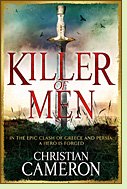Killer of Men
by Christian Cameron
Reviewed by David Maclaine

Killer of Men, which begins at the end of the sixth century B.C., kicks off Christian Cameron's series about the "Long War." This collision pitted the Persian Empire against the assortment of city states making up the ancient Greek world. The saga opens with an account of the very special upbringing that turns a Plataean blacksmith named Arimnestos into, well, what the title says. It seems that when you send your son off to live with a retired warrior guarding a mountain shrine so that he can learn his letters, the young man may end up adding a very different set of skills. Arimnestos also meets the charming-but-manipulative Athenian aristocrat Miltiades, takes part in three battles of local importance in Greece, but, knocked unconscious after the third one, wakes to find himself mysteriously enslaved, shipped across the Aegean and sold to a prominent citizen of Ephesus, a Greek city under the mild nominal rule of the Persian king. There, the young captive meets a number of prominent figures from history, including the powerful Persian satrap Artaphernes, the philosopher Heraclitus, who becomes his next important teacher, the poet Hipponax, and Aristagoras, architect of the revolt of the Asian and island-dwelling Greeks against the rule of the Great King. That fateful rebellion is at the center of the novel's action.
What sets Killer of Men above the average historical novel about the Greeks is Cameron’s ability to describe in precise, believable detail the mechanics of warfare as fought by men at the dawn of the fifth-century B.C. Thanks to him I now have a much-improved grasp of the terrain across which the Ionian revolt played out, and have replaced dry generalizations about Miltiades “the hero of Marathon” with this vivid characterization of the man as equal parts pirate and politician. My only regret on concluding the Killer of Men was that I had waited until I read it to put in an Interlibrary Loan request for its sequel. (2010, 471 pages)
More about Killer of Men at Powell's Books, Amazon.comKiller of Men appears on the list of The 36 Best Historical Novels for a Survey of Ancient Greek History
Other novels about wars with Persia:
A Victor of Salamis by William Stearns Davis (1907), about the Greeks defending their homeland from the Persians. See review or more info at Powell's Books
The Ten Thousand by Michael Curtis Ford (2001), about the Athenian soldier Xenophon and an army of ten thousand Greek mercenaries who fight in a war to topple the Persian ruler. See review or more info at Powell's Books
Memnon (2006) by Scott Oden, about Memnon of Rhodes, who fought on the Persian side against Alexander the Great. See review or more info at Powell's Books
Nonfiction about the early fifth-century B.C. wars between Greece and Persia:
The Histories by Herodotus (5th century B.C.). More info
The Greco-Persian Wars by Peter Green (1996). More info
Persian Fire: The First World Empire and the Battle for the West by Tom Holland (2006). More info
Online:
Greco-Persian Wars at Wikipedia
Back to Novels of Ancient History
Back to Directory of Book Reviews